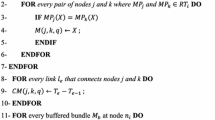Abstract
The standard approach to bundle routing in delay-tolerant networks with predictable contacts uses a graph traversal algorithm to search for paths where the graph’s nodes represent the presumed and non-expired contact opportunities and the edges the waiting time for the next contact to occur. However, unforeseen systemic issues may introduce random contact holdups, i.e., the start time of certain contacts may be delayed, which may lead to lower performance than anticipated. An analysis of random contact holdups and their impact on the probabilistic optimal routing of bundles over parallel, non-overlapping substrate paths are provided. The study brings new insight into the consequences of unforeseen divergences between the planned contacts and their realization, which may help to improve the design of future DTN protocols.
Access this chapter
Tax calculation will be finalised at checkout
Purchases are for personal use only
Similar content being viewed by others
References
Araniti, G., et al.: Contact graph routing in DTN space networks: overview, enhancements and performance. IEEE Commun. Mag. 53(3), 38–46 (2015). https://doi.org/10.1109/MCOM.2015.7060480
Burleigh, S., Caini, C., Messina, J.J., Rodolfi, M.: Toward a unified routing framework for delay-tolerant networking. In: 2016 IEEE International Conference on Wireless for Space and Extreme Environments (WiSEE), pp. 82–86 (2016)
Lent, R.: Analysis of the block delivery time of the Licklider transmission protocol. IEEE Trans. Commun. (2018). https://doi.org/10.1109/TCOMM.2018.2875717
Lent, R.: Performance evaluation of the probabilistic optimal routing in delay tolerant networks. In: 2020 IEEE International Conference on Communications (ICC). Dublin, IE, June 2020
Sanchez Net, M., Burleigh, S.: Evaluation of opportunistic contact graph routing in random mobility environments. In: 2018 6th IEEE International Conference on Wireless for Space and Extreme Environments (WiSEE), pp. 183–188 (2018)
Wang, R., Burleigh, S.C., Parikh, P., Lin, C.J., Sun, B.: Licklider transmission protocol (LTP)-based DTN for cislunar communications. IEEE/ACM Trans. Netw. 19(2), 359–368 (2011). https://doi.org/10.1109/TNET.2010.2060733
Wu, H., Li, Y., Jiao, J., Cao, B., Zhang, Q.: LTP asynchronous accelerated retransmission strategy for deep space communications. In: 2016 IEEE International Conference on Wireless for Space and Extreme Environments (WiSEE), pp. 99–104, September 2016.https://doi.org/10.1109/WiSEE.2016.7877312
Wu, Y., Li, Z.: Queueing analysis for delay/disruption tolerant networks with random link interruptions. In: 2016 IEEE International Conference on Internet of Things (iThings) and IEEE Green Computing and Communications (GreenCom) and IEEE Cyber, Physical and Social Computing (CPSCom) and IEEE Smart Data (SmartData), pp. 94–99, December 2016. https://doi.org/10.1109/iThings-GreenCom-CPSCom-SmartData.2016.42
Yang, Z., et al.: Analytical characterization of licklider transmission protocol (LTP) in cislunar communications. IEEE Trans. Aerosp. Electron. Syst. 50(3), 2019–2031 (2014)
Yu, Q., Burleigh, S.C., Wang, R., Zhao, K.: Performance modeling of licklider transmission protocol (LTP) in deep-space communication. IEEE Trans. Aerosp. Electron. Syst. 51(3), 1609–1620 (2015)
Zhao, K., Wang, R., Burleigh, S., Qiu, M., Sabbagh, A., Hu, J.: Modeling memory-variation dynamics for the licklider transmission protocol in deep-space communications. IEEE Trans. Aerosp. Electron. Syst. 51(4), 2510–2524 (2015). https://doi.org/10.1109/TAES.2015.140907
Acknowledgment
The author would like to thank Prof. Erol Gelenbe for encouraging the submission of this paper. This work was supported by an Early Career Faculty grant from NASA’s Space Technology Research Grants Program #80NSSC17K0525.
Author information
Authors and Affiliations
Corresponding author
Editor information
Editors and Affiliations
Rights and permissions
Copyright information
© 2021 Springer Nature Switzerland AG
About this paper
Cite this paper
Lent, R. (2021). Contact Holdups and Their Impact for Overlay Delay Tolerant Networks. In: Calzarossa, M.C., Gelenbe, E., Grochla, K., Lent, R., Czachórski, T. (eds) Modelling, Analysis, and Simulation of Computer and Telecommunication Systems. MASCOTS 2020. Lecture Notes in Computer Science(), vol 12527. Springer, Cham. https://doi.org/10.1007/978-3-030-68110-4_6
Download citation
DOI: https://doi.org/10.1007/978-3-030-68110-4_6
Published:
Publisher Name: Springer, Cham
Print ISBN: 978-3-030-68109-8
Online ISBN: 978-3-030-68110-4
eBook Packages: Computer ScienceComputer Science (R0)




